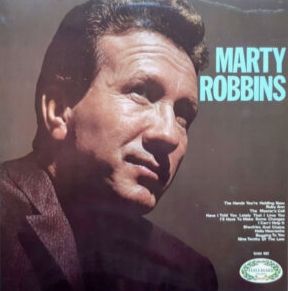
Marty Robbins: “When The Work’s All Done This Fall” – A Cowboy’s Poetic Farewell, Told With a Lonesome Voice and the Weight of Autumn
There are songs, deeply rooted in the soil of American folk and country tradition, that possess a profound, almost elegiac quality—tales passed down through generations until they become less about a single person and more about a shared cultural memory. “When The Work’s All Done This Fall” is one such song. And when rendered by the masterful voice of Marty Robbins, a man who could inhabit the dusty boots of any cowboy or wanderer, it becomes an utterly heartbreaking piece of Western poetry, speaking to themes of hardship, sacrifice, and the eternal, unfulfilled yearning for home.
Marty Robbins recorded his version of this timeless classic for his landmark 1959 album, Gunfighter Ballads and Trail Songs. This album, which contains his signature hits like “El Paso” and “Big Iron,” wasn’t just a record; it was a defining moment in country and Western music, essentially creating the archetype of the sophisticated cowboy ballad. While “When The Work’s All Done This Fall” is not a Robbins original, its inclusion on this seminal album cemented its place in his legacy. As a traditional folk tune dating back to the late 19th or early 20th century, Robbins’s 1959 rendition did not register as a new commercial single on the Billboard charts, but its critical and cultural importance within the framework of the Gunfighter Ballads album is immense.
The history of this song is woven deep into the fabric of the American West. It originated as a traditional lament popular among real cowboys, chronicling the harsh realities of life on the cattle trail. The story, a simple yet devastating one, follows a young cowhand who writes home to his mother, promising to return home when the final cattle drive of the autumn season is complete. He paints a picture of his longed-for reunion, describing the simple joys he anticipates. However, the ballad takes a tragic turn: the young man is fatally injured in a tragic accident—often depicted as a fall from a horse during a sudden stampede—and dies far from home, his promise forever unfulfilled.
Marty Robbins approaches this narrative not with melodrama, but with a deeply respectful tenderness. His voice, usually so commanding, takes on a lonesome, almost fragile quality. He captures the quiet despair of the cowboy life—the grueling physical labor, the constant danger, and the emotional distance from loved ones. When he sings the final verses, describing the cowhand’s dying wish to be buried on the prairie, the scene is rendered with a heartbreaking, dignified simplicity.
For the older listener, this ballad carries a potent sense of nostalgia, not just for the musical era it represents, but for the universal experience of longing. It speaks to the sacrifices made for work, the distances traveled for necessity, and the painful knowledge that life’s promises can sometimes be cruelly broken by fate. The song is a sober reminder of the fragility of life and the immense value placed on “home”—a destination that, for many, remains an idealized haven always just around the next corner.
It is through songs like this that Marty Robbins truly earned his place as a musical storyteller, demonstrating that the most profound human emotions—love, loss, and the aching memory of a promise made—are the true treasures of the Western trail. The song is the sound of autumn coming, not with abundance, but with a heavy, solitary silence.